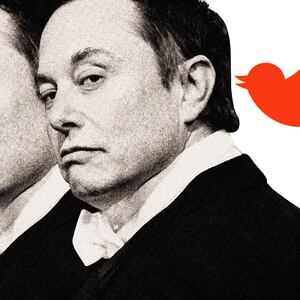Elon Musk’s completed purchase of Twitter last week was met with barely metaphorical sackcloth and ashes, only slightly ironic weeping and gnashing of teeth, and sincere—or very nearly so—expressions of “grief” at the social network’s prophesied demise under Musk’s command.
It’s “Zero Hour for this website, post your favorite tweets and give them a little kiss goodbye,” wrote NBC News’ Ben Collins the night before the sale concluded. “Big, big last-night-of-camp energy,” added immigration journalist Dara Lind. “Twitter, are you grieving,” began a poetic reappropriation from Never Trump conservative pundit Bill Kristol. “It is the blight man was born for / It is Twitter you mourn for.”
I’m not yet convinced Musk’s ownership will bring the worst predictions to pass. But if it does, and Twitter dies, let me offer a word of advice: Don’t mourn too long. You’ll be just fine. In fact, sooner than you think, you might even feel a sense of reprieve, once the hellsite as you knew it has finally gone to hell. I know because I’ve been through this before: I was there when Tumblr died.
From around 2010 to 2015, I was—dubious distinction—pretty big on Tumblr. Not millions of followers big, but certainly a fixture in the politics scene. I peaked around 115,000 followers and was probably the most prominent libertarian voice in those mostly lefty circles for a couple of years. There was a stretch when I could pretty reliably make select posts rack up shares in the tens of thousands, ensuring a viewership many times that number. I never directly monetized my following (like Twitter, Tumblr wasn’t built for that), but it helped me land my first book deal and connect with editors at The Week, where I wrote for seven years.
And then Tumblr died. Well, it still exists, technically, but it went from ranking alongside Facebook and Twitter as a top-tier social network, boasting a purchase price over $1 billion in 2013, to selling for a mere $3 million in 2019. Earlier that year, a single tuna fish had sold for more.
For users, Tumblr’s decline was apparent well before that embarrassing sale was complete. People left. Accounts weren’t deleted, necessarily, but they went defunct. Other big political bloggers I’d read and debated for years began to disappear. (I know of literally one from that era who’s still active on Tumblr today, and the network is so desolate his blog is better understood as an incidentally public diary.) After years of a steady upward climb, my follower count plateaued, then started ticking downward. I posted into the void for a while before wiping the archive and shutting it all down.
It was a little sad, I suppose. But not for long. Not more than a day, if memory serves. Tumblr died, and I found myself not sorry, but relieved. I felt freed to spend my time on better things—and Tumblr was a network I’d found far more functional and enjoyable than Twitter has ever been. I don’t think I ever dubbed it a hellsite.
Yet Tumblr was always an insubstantial, time-bound thing, as every online network must be. It didn’t need to last forever and wouldn’t have worn well if it had. (If you need any evidence of the rot that sets in when social media sites linger past their expiration date, may I recommend checking out Facebook dot com?) These chapters of our internet lives will and should end. Such closure doesn’t negate the good history we have with the decedent, but it does provide a break with the bad history and a helpful push to try something new—maybe even something offline, if you’ll permit a little unsupported optimism.
It will be OK if Twitter dies, too. You’ll be OK. We all will. The end of Twitter will mean the end of some profitable platforms, yes, but if the whole thing goes down, as Tumblr did, everyone will be at the same disadvantage. Or, arguably, we’ll all get the same clean slate. The same erasure of years of petty beefs and tired jokes and obligation posting and déjà vu. Perhaps the death of Twitter would be less of a tragedy and more of a biblical jubilee.
And if Tumblr’s death is any indication, Twitter will decay considerably before its final demise. It will no longer be the community you loved (or loved to hate) when you leave it. The rising stench will drive you off.
Already, as The Atlantic’s Charlie Warzel observed Tuesday, posting is becoming “a losing game full of professional liabilities, endless and futile fights, and diminishing returns,” so more trustworthy accounts are comparatively quiet and lurkers are left with “the loudest, angriest, most politically charged voices” instead. That trend will probably proceed regardless of Musk.
Signing out forever might well be easier and happier than you think.









